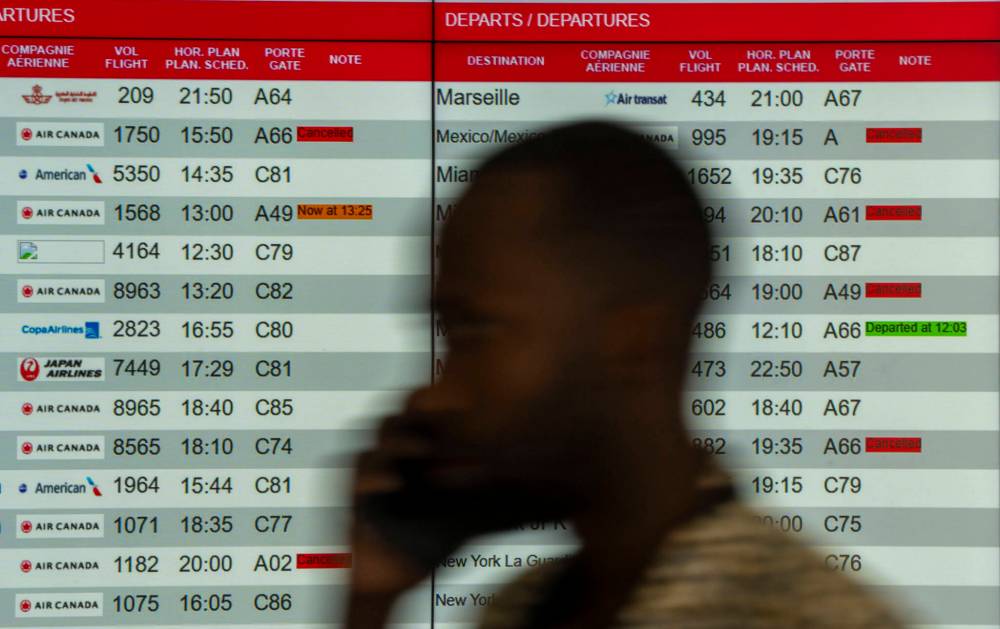Manitoba businesses brace for Air Canada strike Possible work stoppage at Canada’s largest airline would be latest blow after tariffs, wildfires
Read this article for free:
or
Already have an account? Log in here »
To continue reading, please subscribe:
Monthly Digital Subscription
$0 for the first 4 weeks*
- Enjoy unlimited reading on winnipegfreepress.com
- Read the E-Edition, our digital replica newspaper
- Access News Break, our award-winning app
- Play interactive puzzles
*No charge for 4 weeks then price increases to the regular rate of $19.95 plus GST every four weeks. Offer available to new and qualified returning subscribers only. Cancel any time.
Monthly Digital Subscription
$4.99/week*
- Enjoy unlimited reading on winnipegfreepress.com
- Read the E-Edition, our digital replica newspaper
- Access News Break, our award-winning app
- Play interactive puzzles
*Billed as $19.95 plus GST every four weeks. Cancel any time.
To continue reading, please subscribe:
Add Free Press access to your Brandon Sun subscription for only an additional
$1 for the first 4 weeks*
*Your next subscription payment will increase by $1.00 and you will be charged $16.99 plus GST for four weeks. After four weeks, your payment will increase to $23.99 plus GST every four weeks.
Read unlimited articles for free today:
or
Already have an account? Log in here »
Manitoba businesses could be dealt another blow if a looming strike by Air Canada flight attendants halts operations at the country’s largest airline this weekend.
The Canadian Federation of Independent Business said Friday that small businesses are “deeply concerned” with the prospect of a shutdown at Air Canada, which was set to take effect at 1 a.m. ET on Saturday.
“They’re already facing massive economic uncertainty, said Brianna Solberg, CFIB’s provincial director for Manitoba, Saskatchewan and the North. “One third of Canadian small firms depend on the summer season for their revenues. They can’t afford to lose even a single day or take a hit to tourism.”
Solberg said a strike could result in cancellations for hotels, restaurants and other tourism operators.
“And we’ve already had a couple of major things impact the tourism sector, one being the global trade uncertainty, and also the wildfires this year, which caused a lot of people to put a pause on making some tourism-related bookings,” she said.
“One third of Canadian small firms depend on the summer season for their revenues. They can’t afford to lose even a single day or take a hit to tourism,” said Brianna Solberg, CFIB’s provincial director for Manitoba, Saskatchewan and the North.
Earlier this year, the province urged people to avoid travelling to certain destinations in Manitoba to keep hotel rooms available for wildfire evacuees.
“It’s been a difficult year for small business in Manitoba,” Solberg said.
The looming strike that could see thousands of Air Canada flight attendants walk off the job is frustrating for all involved, said a labour negotiations expert — and that’s exactly why strikes can be so effective.
In essence, the power of a strike often stems from its ability to affect not just the employer, but also the public and allied stakeholders.
Julia Smith, an associate professor of labour relations at the University of Manitoba, has studied flight attendant union activism extensively and said the widespread impact of a strike makes it a powerful bargaining tool.
“Workers want to work, they’re frustrated that they’re not getting paid, employers are frustrated because they’re not making money, and whoever is accessing the service, whether it’s a passenger or a customer, they’re frustrated because they can’t get what they need,” Smith said.
A spokesperson for Travel Manitoba said Friday the Crown Corporation is watching developments closely, and with concern.
“Any disruptions to airline traffic negatively impact overall tourism numbers, further compounding a challenging summer season in our province, which has seen many tourism operators struggling because of the impact of wildfires,” the spokesperson said. “We are hoping the parties are able to come to an equitable agreement as soon as possible.”
If an agreement between Air Canada and the Canadian Union of Public Employees isn’t reached before 1 a.m. ET Saturday, 10,000 flight attendants will strike, grounding all airline flights and affecting roughly 130,000 travellers per day.
The strike’s effects were already being felt Friday, with Air Canada announcing on X that it had cancelled 34 flights, affecting more than 7,000 passengers. This follows Thursday’s disruption, when more than 300 flight attendants failed to report for work, cancelling 19 flights and impacting more than 3,000 passengers.
Mark Nasr, Air Canada’s chief operations officer, said Thursday that as many as 500 flights could be cancelled by the end of Friday. By midday Friday, 294 flights had been scrapped, affecting 55,726 passengers, and the union had rejected the company’s request for binding arbitration.
The dispute centres on wage increases and compensation for unpaid work hours. Flight attendants issued a 72-hour strike notice on Wednesday, prompting Air Canada to issue a lockout notice in response. The airline has offered to pay half of a flight attendant’s hourly rate for pre-departure duties performed before a plane pushes back from the gate.
Mark Nasr, Air Canada’s chief operations officer, said Thursday that as many as 500 flights could be cancelled by the end of Friday.
Smith called the lockout “a bold move” and noted it’s generally a sign that negotiations aren’t going well.
“There are far more strikes than lockouts, and that’s simply because employers don’t want to do that, they want to get back to work,” Smith said. “So it’s usually a sign that things are quite hostile and toxic when you’re seeing employers lock out.”
Meanwhile, the Angus Reid Institute reports that Canadians are largely siding with the flight attendants in the dispute.
The independent, self-commissioned poll found three-in-five (59 per cent) believe Air Canada should provide full hourly wages for all aspects of a flight attendant’s work, while 41 per cent say keeping airfares low should be the priority.
”Notably, however, more frequent fliers — those who have taken to the skies three times or more in the last year — are evenly split on the matter, with half (51 per cent) siding with flight attendants demands, and the other half more focused on not seeing the increased costs of such compensation passed along to them,” the release said.
scott.billeck@freepress.mb.ca

Scott Billeck is a general assignment reporter for the Free Press. A Creative Communications graduate from Red River College, Scott has more than a decade’s worth of experience covering hockey, football and global pandemics. He joined the Free Press in 2024. Read more about Scott.
Every piece of reporting Scott produces is reviewed by an editing team before it is posted online or published in print — part of the Free Press‘s tradition, since 1872, of producing reliable independent journalism. Read more about Free Press’s history and mandate, and learn how our newsroom operates.
Our newsroom depends on a growing audience of readers to power our journalism. If you are not a paid reader, please consider becoming a subscriber.
Our newsroom depends on its audience of readers to power our journalism. Thank you for your support.










